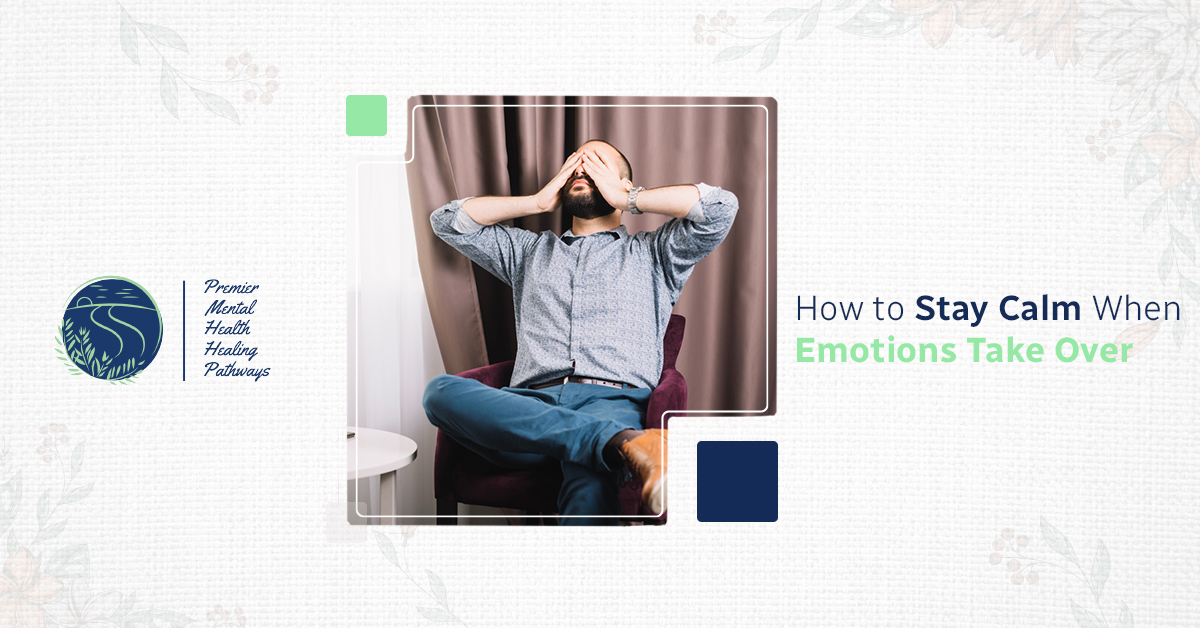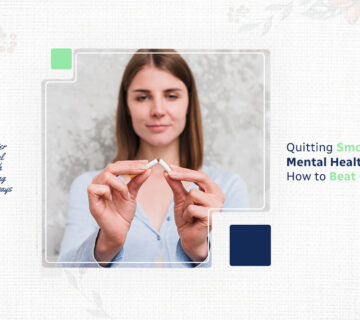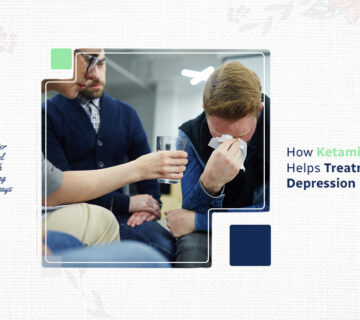In moments of emotional overwhelm, remaining calm can feel impossible. Emotions like anger, anxiety, sadness, and frustration can make it hard to think clearly. They determine how we react. Staying cool is essential for personal stability, relationships, and professional success.
At Premier Mental Health Healing Pathways, we know that your feelings form a large part of your experience. You can be stronger after going through the highs and lows in life by becoming less anxious with a bit of care and assistance.
Below, we’ll outline straightforward ways to stay calm when emotions feel too big. These tips are simple and may make you feel better if you feel bad due to life’s hardships.
What Are Emotions?
Emotions are the feelings within us that help the mind to appreciate what is important, what hurts, and what brings joy. At premier, we consider that every emotion has a purpose. Some of the common emotions include:
- Happiness: When something good resonates with you.
- Anger: When you feel that something is unfair or damaging.
- Sadness: When there is a sense of loss or feeling lonely.
- Fear: When one has uncertainty and worries.
- Excitement: When something meaningful is about to happen.
At premier mental health, we teach that every emotion is valid, even the “difficult” ones. However, it is good to start caring gently for oneself when such feelings grow.
Why Do Emotions Take Over?
Big emotions often come when something important happens. Maybe:
- Someone said something hurtful.
- You received a negative grade at school.
- Groups of friends make you feel isolated.
- You have a problem at home.
When such things occur, the brain assumes that you are under threat. Your pulse beats, you feel hot, or your stomach is tight.
Step-by-Step: How to Stay Calm
Here are ways to help you manage strong emotions. These steps can support your emotional and mental wellness.
-
Recognize the Emotion Before Reacting
Awareness is the first step in calming down.
Allow some time before reacting to a situation and name the feeling. Ask yourself:
- Am I angry, scared, envious, or hurt?
- What set me off?
Labeling your feelings helps activate the prefrontal cortex. This part of the brain handles rational thinking. It becomes more straightforward to comprehend and handle. At premier mental health, we encourage this step to create space between feeling and reacting.
-
Practice Deep, Intentional Breathing
A major way to bring peace to your mind is through systematic breathing.
Technique: 4-7-8 Breathing
- Inhale for 4 seconds
- Hold your breath for 7 seconds
- Exhale slowly for 8 seconds
This approach stimulates the parasympathetic nervous system, which goes against the reflex of stress and leads to relaxation.
Do the same approach of 2-3 minutes whenever emotions start overcoming you.
-
Engage in Grounding Techniques
When sentiments rule, we commonly lose touch with the moment. Grounding can refocus your mind back on the present here and now.
Try this 5-4-3-2-1 Method:
- 5 things you can see
- 4 things you can touch
- 3 things you can hear
- 2 things you can smell
- 1 thing you can taste
It is a sensory-grounded process that pulls you out of emotional chaos and into calm awareness.
-
Use Gentle Words with Yourself
Often, emotions grow stronger because of harsh inner talk. Replace those thoughts with kindness:
- “It’s okay to feel this way.”
- “I can get through this.”
- “I do not have to have all the answers at this point.”
At premier, clients learn to treat themselves kindly, like treat others.
-
Move Yourself from the Triggering Environment
When emotions peak, step away, physically or mentally.
- Go for a short walk.
- Listen to calming music.
- Splash cold water on your face.
- Close your eyes and visualize a peaceful place.
Distance creates clarity. Removing yourself reduces the stimulus and gives your nervous system time to reset.
-
Take a Break
If you’re feeling overwhelmed, give yourself a break.
- Go to a quiet place.
- Listen to soft music.
- Close your eyes for a few minutes.
- Drink some water.
Even a short break can help you feel more in control.
-
Seek Support When Needed
Support is always available. You don’t need to face emotional overload alone. Turn to:
- A trusted friend or family member
- A professional counselor or therapist
- A healing space like premier mental health
Support from others can help you find deep emotional patterns. It also gives you tools to build lasting calmness.
-
Write or Draw Your Feelings
Sometimes, it’s hard to say how we feel. Writing or drawing can help.
- Write in a journal
- Draw what your feeling looks like
- Write a letter (you need not send it)
These things help you understand your emotions better.
-
Create a Calm Kit
Make a “Calm Kit” with things that help you relax. Put them in a box or bag. Use it when you’re feeling upset.
Some ideas:
- Stress ball
- Coloring book
- Favorite toy
- Soft blanket
- Photos that make you smile
- A list of happy memories
Your Calm Kit is like a hug in a box.
When to Ask for Help
Some emotions feel too heavy to carry alone, and that’s okay. Rehabilitation needs time, help, and safe zones.
Reach out if:
- You feel overwhelmed more days than not
- You’re thinking about hurting yourself or others
- You feel stuck, numb, or hopeless
At Premier Mental Health Healing Pathways, we provide a nurturing space for therapy, coaching, and advocacy where every part of your experience is honored.
Final Words
Emotions change like the seasons. Some days are bright, others are rainy, but each helps you grow.
You don’t need to “overcome” emotions. You must pass through them carefully, utilizing resources that stabilize you, back you, and reinforce you.
Whether planting new intentions or harvesting peace, your healing journey matters.
Let’s grow together. Because at premier, every season can be a step toward healing.
Ready to take the next step toward emotional wellness?
Visit Premier Mental Health Healing Pathways on Google. Connect with us for therapy, wellness support, or personalized healing.
FAQs
Q: Is it possible to use some calm to cope with anxiety?
Yes. Breathing and grounding are some of the techniques that assist your mind and body to come back to balance.
Q: Is it fine to get out of conflict?
Yes. Getting out of conflict is good and reasonable, especially when it means reducing stress.
Q: How can I quickly de-stress and relax?
A recommendation is slow breathing as you observe your environment, but this is often rapid and beneficial.






No comment